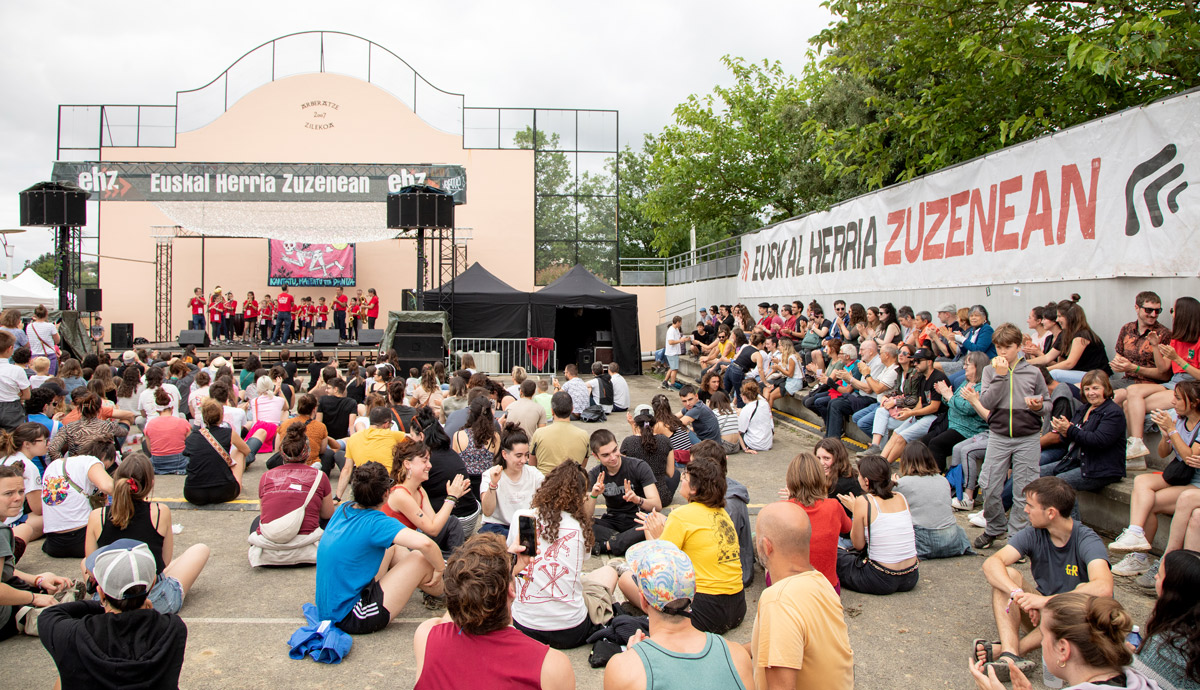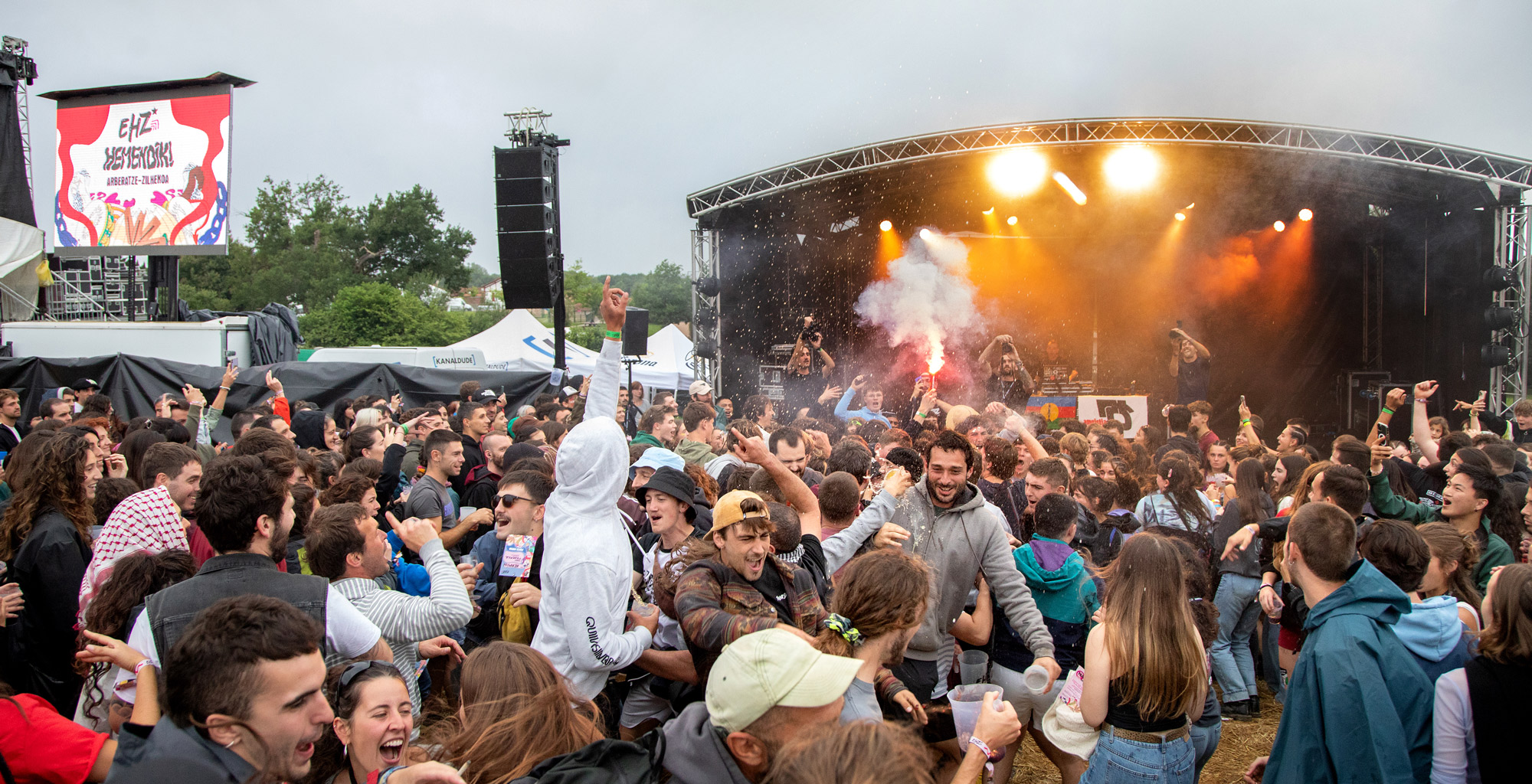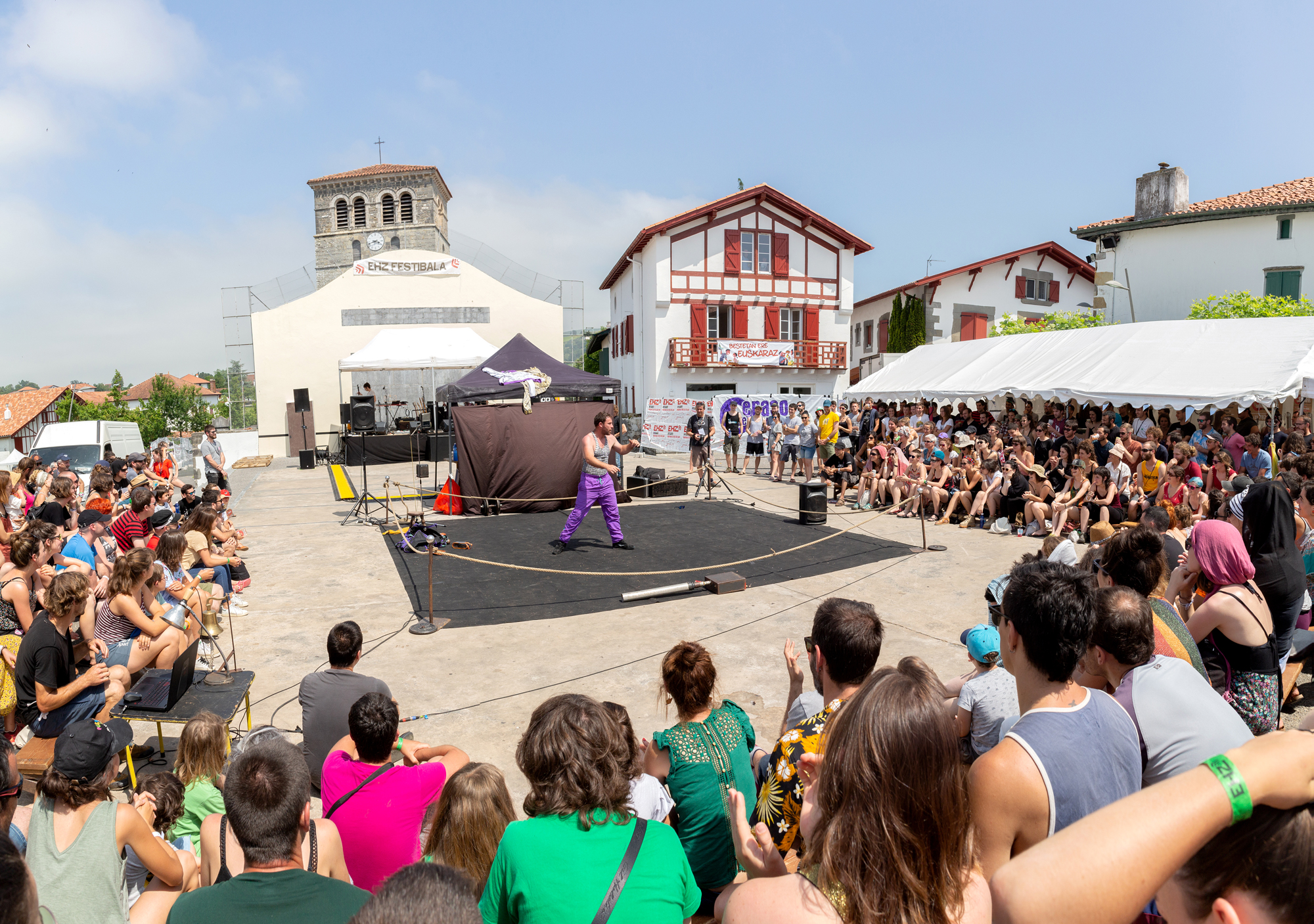"Try to provoke a series of tour confusions, remembering different people"
- In the last 26 years the Festival Euskal Herria Zuzenean continues to organize a space of seminars, training and collaboration of alternatives. The reflection has postponed a series of questions to the members of the RSI coordination team of recent years, Joana Barbier, Kattina Haran-Raizin and Julen Oillarburu. Next, their responses provide us with stops to ensure the diversity of participation, to emote the young public and to know closely how to combat discrimination.

How did you know the EHZ Festibala and what motivated them as collaborators and managers?
Cattín: I've been one of the founders of the My Father festival, from Ttipi I've been to EH. When I was 15/16 years old, I appointed myself as an assistant for the first time and, after a few years, with some members of the Uztaritz Cheese Shop, we completed the Collaborators Relay Commission. In this way, for three days I took on more responsibilities as a collaborator and joined the coordination team. The relationship and pleasure have led me to assume these responsibilities.
Ida: I've always known the EHZ festival. When I first participated, it was in Heleta. While at school, the proposal to participate in the dance creation project called “Sorgin” was extended. In the following years I worked as an assistant in different positions for three days: camping, circulation, accommodation… In 2018 the organization of the LER called new young people to take over. For me, it was a lot of evidence, and from there I joined the coordination and the programming team. Entering the organization brings you another vision of the festival. On the one hand, the trainer is a project that worked in many areas and with many different people, and on the other hand it is a project that fills you with energy.
Julen: I know it from the LER ttip. From the Liceo I have participated as an assistant and that has been quite natural. Like Joana, in 2018 we motivated ourselves with a group of friends and becoming involved in them. Hameka racimos took me to a military in HD: it is a training space, if it is an opportunity to learn to work collectively, to meet other agents and, above all, in Euskal Herria we need a space like this.
“Promoting exchange and knowledge among young people from different backgrounds and social settings makes the RSI one of the most unique initiatives in the Northern Basque Country”… How can this be achieved?
Cattín: Initially, one of the objectives of the RSI was to promote exchanges between young people on the coast and the interior. But I’m not sure that “young people from different backgrounds and social backgrounds” come to the RSI completely. Various socio-economic and cultural realities intertwine in their geographic area in the North. So, there are those who come to the LER every year, because they are socio-cultural conditioners, there are those who call the CER or at least know the festival, and there are those who have not even heard the word nihune “EHZ”. They look like parallel worlds, but we try to create a series of confusions that remind different people like montages, dismantles and festivals. Last March, for example, we were taken to EHZ Biarritz for that purpose. It is not a mixture that becomes “natural”, but we want to drive it, either through collaborators, festivals, etc., encouraging people to participate in different sleeves.
What do you do in the RSI to ensure the “organization that defends the Basque language, identity and culture” due to the socio-linguistic situation of EH Bildu?
Cattín: As its name suggests, Euskal Herria Zuzenean is the showcase of language, identity and culture. We establish the conditions of socialization of Euskera and Euskera in the LER, prioritizing Euskera as a vehicular language in the internal sphere and communicating it in Euskera facing the outside, exchanging it and making all types of representation of our culture uncovered to the public. The fact that the festival has a “festival” and a good time allows, in our opinion, to develop the informal use of the Basque country. In the end, for us, the RSI is a means or tool to live and dialogue in Euskera. In this range, I am told that the RSI is located outside the dominant socio-linguistic situation in the Northern Basque Country. There are still thousands of spaces of this kind, not to mention that the Basque Country is associated with anti-capitalist values and ideas…
How do the participation of new generations in the RSI work? In other words, what is being done at the organisational level to go ahead and ensure the level of quality, to link new partners and to engage in new responsibilities?
Julen: It is true that the strength of the RSI is that it has remained generation after generation and has always been frightened after 26 years. The project has a reproduction capacity. By participating as a collaborator, more responsibilities are gradually being acquired and the diversity of commissions (logistics, administration, accommodation, food, communication...) allows each one to become militant in the space they want. In addition, it is always in contact with other actors, for example by exchanging material/logistics/shifts with other associations. This creates a partnership with other actors. This year, in order to emote the younger audiences, we have launched the EHZ project lizeoak, in several schools of Ipar Euskal Herria we have proposed playful sessions on Basque culture and organization of initiatives.
Political supply is at the forefront of the RSI (workshops, conferences, round tables, other collective crops, etc.). ). ). Why that choice and what are the most outstanding training sessions this year?
Ida: It has the same priority as the other offers and the political offer materializes with the RSI. The festival does not take the pada position, but gives priority to the debate, offering some keys to the critical reading of the current problems. Issues such as the war in Ukraine, mental illness or the struggles of the countries of origin will be addressed. But we also intend to make a leap from words to practices. Among the work carried out this year, we can mention the rap project that has been created with the young migrants of the Don Bosco Institute and the departure we have organized in Brittany, through the promotion of Redadeg.
To ensure that the RSI is a space free from aggression, some pioneering measures began to take place in practice. What are the characteristics, what consequences have they had and how is this department going to work this year?
Cattín: Yes, the RSI is not an island outside society and, therefore, it is not an island except for the violence that is exercised in society. However, we would like us to have a safe LER place for all of you. That is why the CER Aggressions Fighting Brigade launched last year a protocol to respond to the Machian aggressions and this year has developed and developed a protocol that also responds to racist aggressions and LGBT phoboes. Through these protocols we intend to create a culture that does prevention work and does not accept aggression. Safe curas from festivals and collaborators and in case of aggression, in order for promoters to be in charge. We believe and trust that the work carried out by the Council against the Aggressions last year at the CER has opened the way for reflection, encouraging other events and associations to take my thoughts on these realities. In the same sense, any type of attack (gender, origin, etc.) It can be answered in a serious and forceful way, as well as being respected by all in front of them, all those responsible for the RSI will have and deny the foral invention of the protocol. However, there is still a long way to go.
At this year’s RSI (1/2/3) in the music sections, workshops, spectacular, different compromises, what would you highlight or recommend?
Ida: I'm not going to particularly recommend a show or a concert. One more year, make a broad offer for all participants to enjoy the pleasures. Anyone can abide by something they like. On the one hand, we continue to program groups and shows from Euskal Herria, as in recent years, offering the CER a local group scene. On the other hand, we have decided to bring other groups from outside, so that they discover groups of other styles and peoples. But besides the program and the different shows proposed, I think the festival goes further, because the audience has come to live something special for three days. The LER is a project that emotionally gives you a Christian coffee, because, urgently, for 3 days you see people happy, warm, laughter, working. So, if you want to strengthen it with your energy, come and enjoy the LER Festibal, where you will be more charged than ever before.
Cattín: One more year, as in previous years, we need a companion. Motivate! Even for mounts and dismantles, the atmosphere will be perfect! Our generation is getting stronger and safer this year is going to be the festival. In the different initiatives that have been carried out throughout the year we have seen the influx and motivation of the people: the success of the spring initiative, the presentation of the lyceums, the participation in Redadeg… The festival is strong! Years later we will try to improve the standard and this year we will make the finitions that were lacking in previous years. Come and enjoy!
Julen: As Odei Barroso tells in his Therapy: “The drill boomba-pa traps, the map is getting rich!” It is difficult to place particular emphasis on something, but I am a fan of rap and the development of the Basque rap is very exciting to me. Odei Barroso presents the Therapy album he released in April and the concert of raplari Eesah Yasuke, which is held from northern France, arouses curiosity. I can also mention the special rap programme to be organised with Kanaldude and which will bring together several raplaris from the Basque Country. Project with immigrants… Izan, on the street, in music, in politics, the Basque country has to conquer new spaces. Therefore: “Welcome to the club.”
Beware! Achtung! “Pass the message. When we come to the CER, control the huge flika with the chakurros!” Cases... At Amikuze you can't leave it alone either, he said one of the festivals that after passing control he tries to park his car. He has later seen that message that... [+]
Nola ezar euskara, gal-bidean, ahal-bidean eta zabal-bidean? Galdera horri ihardukitzen entseatuko da Mattin Irigoien Zabalik elkarteko kidea, ostegun honetan eskainiko duen mintzaldian.
On
July
2 in Irisarri (Nafarroa Beherea), at the EHZ festival.
-----------------------------------------------------------------
Anyone who has ever been to the LER knows what Sunday is. We are there. This year the rain invites us to be under the cover of the van, but as... [+]
On the one hand the heavy rain, on the other the unbearable sauna. And the sun of Sunday afternoon, excessive for many. Maybe not, but it was convenient to bring the umbrella as light as possible, as at any time it touched the rain, but it was also hot, so it was essential to... [+]












.jpg)
.jpg)
.jpg)
.jpg)

.jpg)



.jpg)







.jpg)









